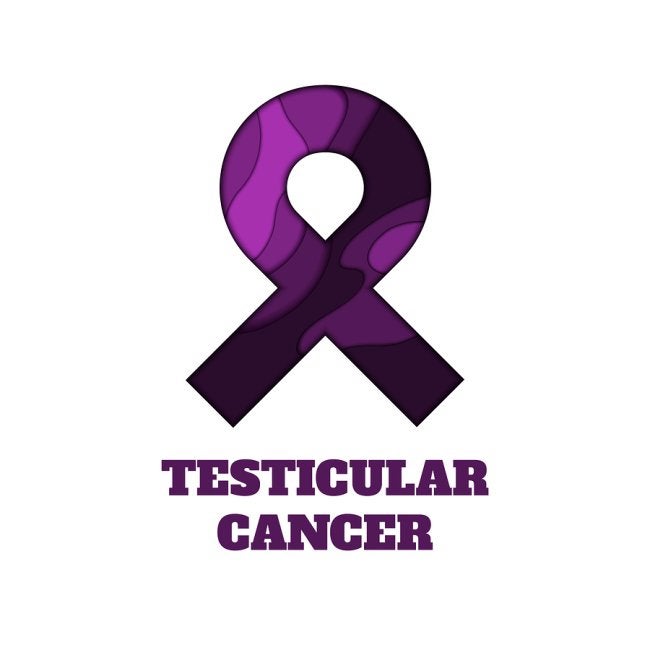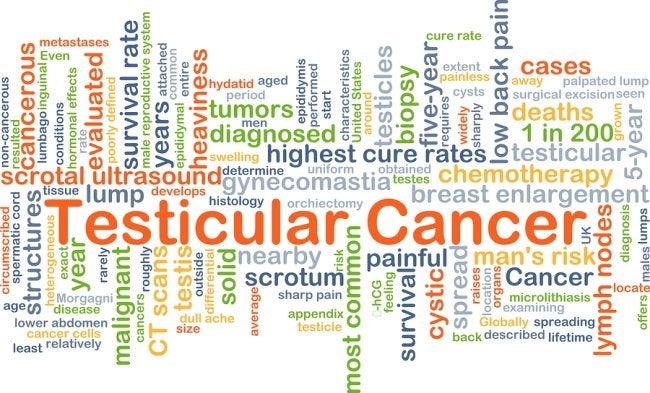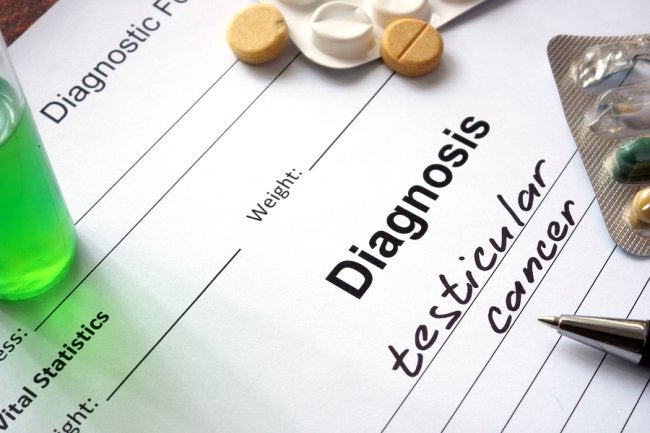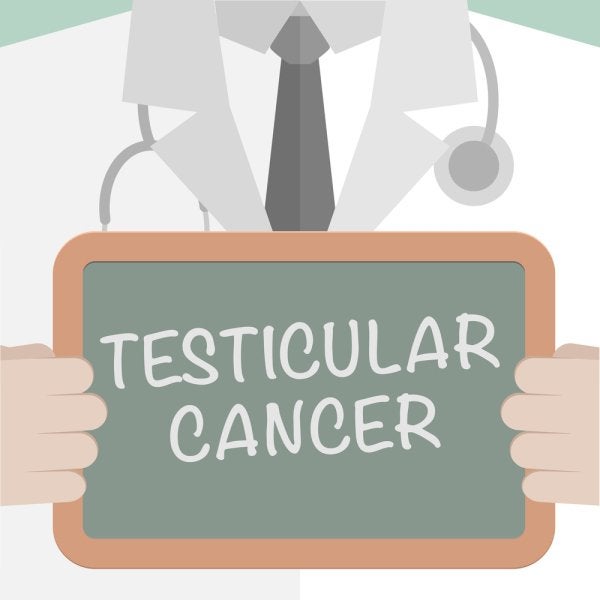-
Spotlight on the Symptoms of Testicular Cancer
 Testicular cancer is relatively uncommon, so men are often unaware of the symptoms. Unlike many kinds of cancer, about half of all cases of testicular cancer occur in young men between the ages of 20 and 34, though it can affect men at any stage in their lives, including in infancy. Typically, testicular cancer can be cured in its early stages, so it’s important to see a urologist if you think you could be experiencing any of these testicular cancer symptoms.
Testicular cancer is relatively uncommon, so men are often unaware of the symptoms. Unlike many kinds of cancer, about half of all cases of testicular cancer occur in young men between the ages of 20 and 34, though it can affect men at any stage in their lives, including in infancy. Typically, testicular cancer can be cured in its early stages, so it’s important to see a urologist if you think you could be experiencing any of these testicular cancer symptoms. Painless Lump
The most common indicator of testicular cancer is the appearance of a painless lump on a testicle. Occasionally, the lump may become tender or painful, but in the vast majority of cases, it is not. When you do experience pain with testicular cancer, it is more likely to be in the lower belly or in the entire scrotum rather than just at the site of the lump. It is often described as a deep ache or a feeling of heaviness.
Testicular Swelling
Some men with testicular cancer notice that one of their testicles has become larger or swollen. Although it’s natural for men to have testicles that are different sizes, with testicular cancer, an existing difference in size may become more pronounced. This can happen with or without the presence of a lump.
Breast Growth
Testicular cancer can lead to a hormonal imbalance that causes breast growth or tenderness in men. These hormonal changes can also result in a loss of sex drive. Pre-pubescent boys who develop testicular cancer may experience more pronounced hormonal symptoms, including the sudden deepening of the voice or facial hair growth.
The symptoms of testicular cancer can also be associated with a number of other conditions, so let a urologist at Urology Associates, P.C. make an accurate diagnosis, so you can get the appropriate treatment. For a diagnosis and testicular cancer treatment in Nashville, call (855) 901-1338.
-
A Stage-by-Stage Look at Testicular Cancer Treatment Options

A testicular cancer diagnosis is devastating. Patients may regain a sense of control over their lives by studying their treatment options with the help of a urologist. Like many other cancers, testicular cancer is often treated with multiple types of medical interventions. Urologists carefully develop treatment recommendations based on the stage and specific type of testicular cancer, along with the patient’s overall health.
In Situ
In situ cancer, or stage 0 cancer, is diagnosed when the cancer is confined to the testicle and the patient doesn’t have elevated levels of tumor markers. In some cases, in situ testicular cancer is managed with close surveillance. It may only need treatment if it shows signs of growing or spreading. If in situ cancer is treated, the testicle is usually removed or treated with radiation therapy.
Stage I
Stage I treatments depend on whether the cancer is a seminoma or non-seminoma. Stage I seminomas are treated surgically by removing the spermatic cord and testicle , followed by active surveillance, or either chemotherapy or radiation therapy. The treatment for stage I non-seminomas typically involves the surgical removal of the testicle, followed by one or more of these options:
- Active surveillance
- Removal of the lymph nodes at the back of the abdomen
- Chemotherapy
Stage II
If the patient has a stage IIA seminoma, he will likely have surgery to remove the testicle, followed by radiation treatment directed at the retroperitoneal lymph nodes. Otherwise, the urologist will likely recommend three or four cycles of combination chemotherapy. After the surgical removal of the testicle for patients with stage II non-seminomas, the level of tumor markers will determine the subsequent treatment. It may be chemotherapy, or the removal of lymph nodes, which may possibly be followed with chemotherapy.
Stage III
Although stage III testicular tumors have spread beyond the testicles, they are still highly treatable. Patients can expect the surgical removal of the testicle, followed by aggressive chemotherapy. It’s possible for cancer at this stage to spread to the brain, in which case the preferred treatment is usually radiation therapy. Surgery might also be an option.
Men with testicular cancer in Tennessee need answers and treatment options they feel confident about. That’s why so many patients have turned to Urology Associates, P.C. for cutting-edge care delivered by compassionate, understanding healthcare providers. New and current patients can reach us at (855) 901-1338.
-
Get the Facts About Testicular Cancer

Testicular cancer stands out from other forms of cancer in that it is more common in young men than older men. Because it often occurs in a population that is not considered to have a high cancer risk, men with testicular cancer may often miss the early symptoms because they are unsure of what to look for. Fortunately, cancer treatment from your urologist can be effective in helping you beat this disease. Explore the facts about this disease and the testicular cancer treatments so you can be vigilant about your own health.
Recognizing Your Risk Factors
There are several risk factors for testicular cancer, however, most men who develop this kind of cancer do not have any noticeable risk factors present. Having an undescended testicle is one of the biggest risk factors, so your doctor may monitor you for testicular cancer symptoms if you have this condition. HIV infections, being Caucasian, and having a family or personal history of testicular cancer may also increase your risk. Approximately 50 percent of men with testicular cancer are between 20 and 34, but it can and does affect men in all age groups, including infants.
Spotting the Symptoms
A lump or swelling in one testicle is a common sign of cancer. In some cases, men may develop gynecomastia as the result of testicular cancer. Young boys who develop testicular cancer may experience an early onset of puberty. In some cases, men do not have symptoms at all in the early stages and may develop back pain, belly pain, headaches, and shortness of breath as a result of testicular cancer that has spread. Performing self-exams can help men recognize the symptoms sooner.
Talking About Treatment
Testicular cancer treatments vary depending on the stage of the cancer at the time of diagnosis. Surgery to remove the affected testicle as well as chemotherapy, radiation, and stem cell therapy can all be helpful.
Testicular cancer treatment in Nashville starts with the urologists at Urology Associates. If you have symptoms, get on the road to diagnosis and treatment today by calling (855) 901-1338.
-
Recognizing the Signs and Symptoms of Testicular Cancer
While doctors are unable to diagnose testicular cancer based exclusively on symptoms, there are some signs that can indicate the possible presence of cancer and prompt you to speak with your doctor. If you notice any of the following symptoms, you should not hesitate to schedule an appointment with Urology Associates P.C. to discuss your testicular health. There has been an increase in the rate of testicular cancer diagnosis, but this type of cancer is highly treatable. In fact, more than 95% of cases will result in successful treatment when symptoms are brought to the attention of a doctor early on.

Growth on the testicles
The primary symptom of testicular cancer is a lump on or in the testicle. Testicular lumps are typically painless and can be felt with the hands. Swelling or enlargement of one testicle is another possible symptom, and this may take place without the presence of a lump.
Aching or heaviness in the lower belly
Most often, testicular cancer does not cause pain, but some men will experience a heaviness or aching in the lower belly or scrotum. It’s important to address any abnormal pain with your doctor, since pain in this area could be a sign of other serious medical conditions if cancer is not present.
Breast growth or tenderness
There are rare cases in which certain types of testicular cancer will cause fluctuation in hormones, which may lead to the development of male breasts or soreness in the breast tissue. A reduced sex drive can also result from these hormonal fluctuations.
Low back pain
If testicular cancer spreads to the lymph nodes, there may be pain in the lower back or belly. However, many men will experience no symptoms when testicular cancer spreads, which is why it is essential to seek medical care for symptoms that take place in the testicles.
To schedule a consultation where you can discuss your symptoms, call Urology Associates P.C. at (888) 329-7700. Our Nashville practice offers state-of-the-art care onsite from a team of 34 urologists providing compassionate care to men and women.
Recent Posts
categories
- Uncategorized
- Bladder Cancer
- Women's Sexual Health
- MonaLisa Touch
- Urology
- Urologist
- Erectile Dysfunction
- Kidney Cancer
- Incontinence
- Prostate
- MonaLisa Touch Laser Treatment
- Kidney Stones
- Urinary Tract Infections
- Event
- Sexual Dysfunction
- Testicular Cancer
- Prostate Cancer
- Urology Surgery Center
- urinary incontinence
- vaginismus
- noncoital pain disorder
- Hypoactive Sexual Desire Disorder
- Infographic
- provenge
- Xofigo
- robotic surgery
- hormone replacement
- diabetes
- renal cell carcinoma
- pelvic pain
- hematuria
- sexual health
- chronic testicular pain
- premature ejaculation
- Men's Health Clinic
- Dr. Melvin Seard
- Interstitial Cystitis
- vasectomy
- overactive bladder
- vaginal atrophy
- nocturia
- bladder infections
- urethral strictures
- Acute Epididymitis
- low sex drive
- circumcision
- pelvic floor dysfunction
- Peyronie's Disease
- prostatitis
- female sexual dysfunction
- varicocele
- difficult urination
- low libido
- PSA levels
- male fertility
- penile prosthesis
- prostatic intraepithelial neoplasia
- male infertility
- estrogen levels
- nurse navigator
- stress urinary incontinence
- vaginal yeast infection
- elevated psa
- painful sex
- adult circumcision
- epididymitis
- OAB
- kidney infection
- penile cancer
- pelvic organ prolapse
- Vasectomy Reversal
- bone health
- cystectomies
- clinical trials
- bloody urine
- Advanced Therapeutic Center
- WISH MedSpa
- neurogenic bladder
- WISH Team
- prostate biopsies
- BPH
- fecal incontinence
- lithotripsy
- osteoporosis
- kidney cysts
